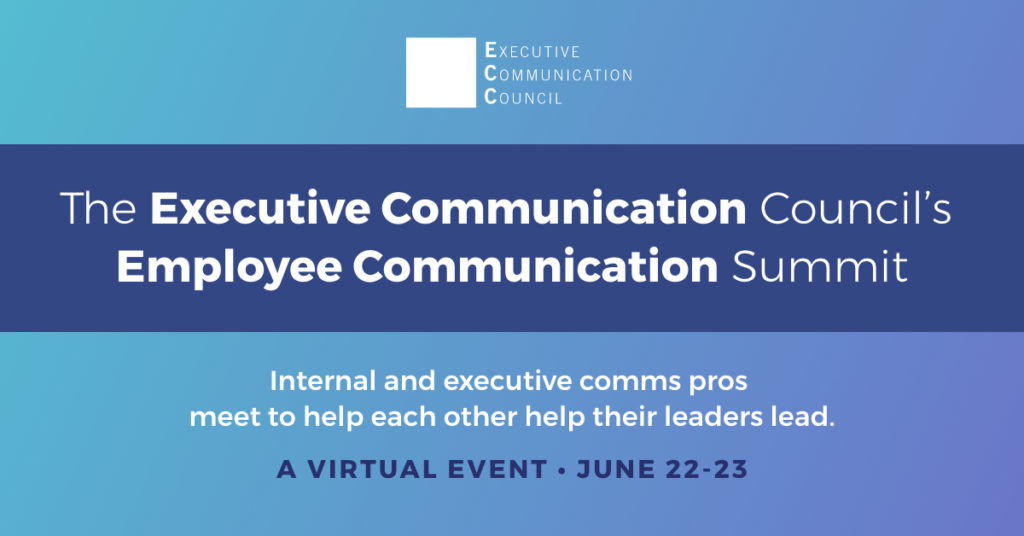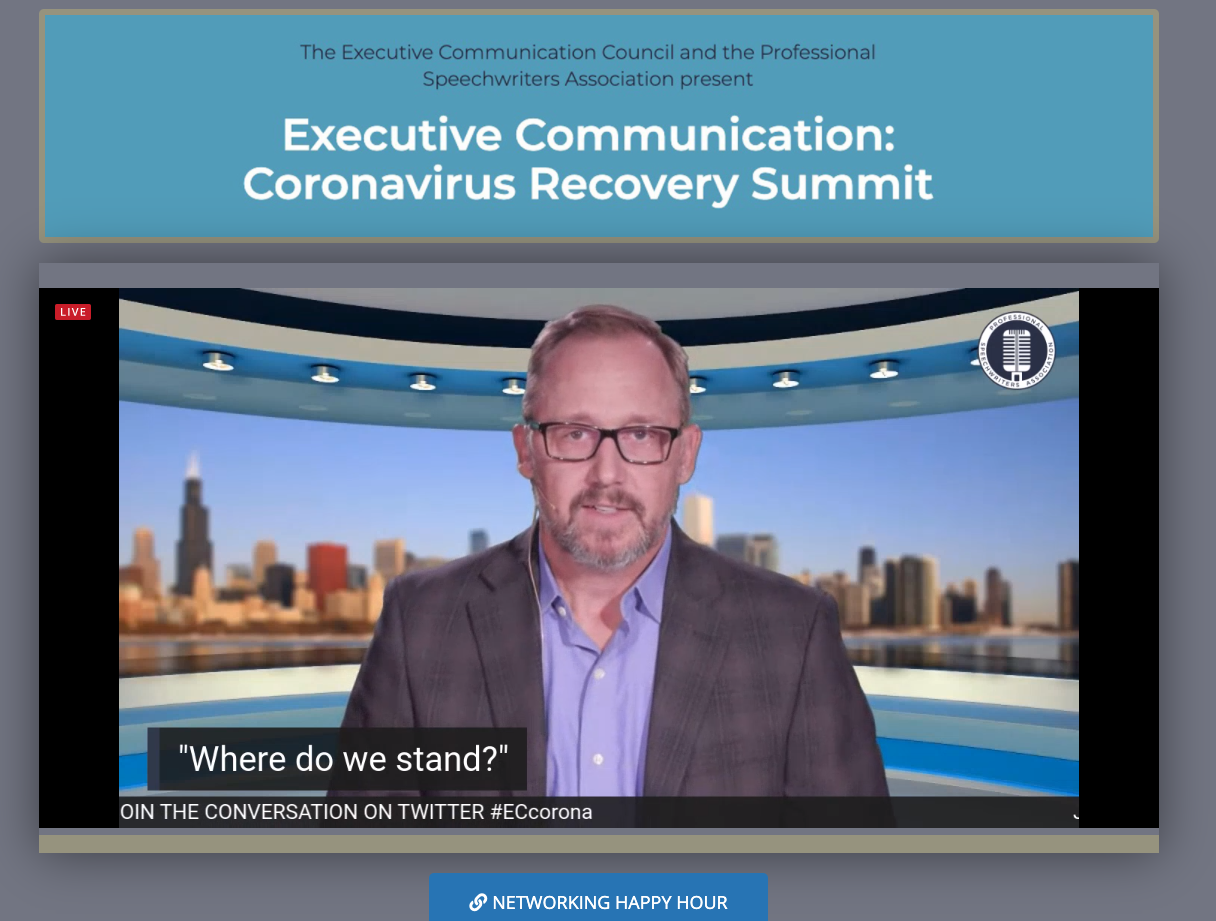Fear and loathing in leadership communication
May 05, 2021
Survey respondents cite reckless culture change, deep confusion, personal exhaustion and "zero time for reflection."
As the pandemic lifts and life slouches backwards toward normal, we’re hearing more, not fewer, reports of real distress among the communication colleagues we serve. Communicators routinely breaking down in tears during one-on-ones with their bosses. Communicators taking drugs of various kinds to get through the day. Communicators struggling to remember what once made their work meaningful.
Some of this distress is professional, and some of it is personal, and its sufferers at this point barely know the difference.
So I’ll try to define it, as I share with you two kinds of responses we received in response to an Executive Communication Council survey of exec comms pros and internal comms folks, in preparation for the ECC’s Employee Communication Summit, June 22-23.

At the end of a fairly long survey, we asked these communicators what keeps them up at night. The question was optional, but about four-fifths of participants wrote answers—many of them long and emotional.
Issues We Can Help You With, at the Summit and Elsewhere
• Culture change, and not in a good way. “Our culture is in jeopardy and being dispersed during the pandemic has made it worse,” said one communicator, who was echoed by another: “I worry about our corporate culture (very well-known) staying the same in the new hybrid world.” And a third lies awake thinking about “the possibility that society is permanently fractured, and the impact that will have on our institutions. Internal communications is a form of culture-building work. If your employees are Balkanized based on personal identity, political attitudes, social networks, etc., and that personal partisanship seeps into the workplace (as it will do) then you can’t build a cohesive culture and thrive as a whole organization. What then?”
• When CEOs talk too much. “I worry that our CEO’s insistence on communicating so frequently and intimately—over so many channels—will lead to her becoming overexposed, exhaust employee attention, and ultimately lead people to start tuning her out. If a video message from the top comes so regular as to be unremarkable, will the platform lose its power?”
• How to reach the kids, these days. “How to balance the executive communication practices vs. the new content consumption patterns of new generations, entering the workforce (or soon to enter). I personally don’t believe executive communications are compatible with many of the aspects of the new ‘influencer’ figures on tiktok, etc.”
• A lack of professional background to do the work the job demands. “I am not a social media specialist but that seems to be expected in many roles now or for employee engagement. [Also], I do not have HR experience specifically, which many roles want.”
• Can yesterday’s team meet today’s challenges? “Wondering if I have the right staff in place. They are talented, and many have been with the company a long time … but they are not able to keep up with the pace of change that has been happening since the pandemic hit. I don’t have anyone who can backfill for me while I’m out.”
• The communication lane is too narrow for this trip. “I’m worried about D&I. I’m worried about how to measure, demonstrate, and communicate progress in this area and have attended some trainings on this over the past year. But it’s much more than a communications problem, and I don’t have control over anything but communications.”
• What statements so many CEO statements make. “It’s a dance to understand how and when a CEO should react or speak to current events and news ‘outside’ the company. I think the more we all work to message around social justice, the more we’ve opened our minds to the notion that the outside world is very much part of our employees, our business and our culture. But the need for balance is real. CEOs should not and cannot comment on everything. It’s becoming a matter of authenticity and thought leadership mixed with business objective. Nearly impossible to get right. Hard to do but also amazing (and rewarding) when you do find the right entry points.”
• Sound, deep thinking needed to grapple with the next phrase of radical culture change.“Most decision makers seem to be drinking the koolaid, which extols the virtues of the new way of working. Just like globalization did not go deep into how people should work together in an increasing multicultural yet polarized world, I think there will be a heavy price to pay down the road.”
We can work on that stuff, and we will, for two days at the ECC’s Employee Communication Summit.
Issues You Can Help Each Other With, at the Summit and Elsewhere
• True confusion. “Everything is important, which, for comms, translates into nothing is important. This was the case prior to the pandemic, and it’s gotten much worse. [Employees] just can’t keep up with the change, and they are frustrated that our organization thinks what’s being thrown at them is reasonable. For those of us in comms … We’re working 60, 70, 80-hour work weeks as the norm because we’ve never been more critical to the business. Having said that, our engagement and ‘morale’ scores are way up due to the company’s response to the pandemic. For all of the change our employees are experiencing, the caring and transparency of our executive team has been incredible (due, in no small part, to comms).”
• Fear itself. “That we as communicators don’t push to be advocates for our internal stakeholders and ‘force’ our Execs to engage differently.”
• Exhaustion, and loss of perspective. “People are FRIED. I’m fried. My team is fried. The boundaries between work and life have disappeared. I worry that the overall profession will weaken due to waning mental health.” Another: “I am tired and cannot continue to carry this burden of urgency across disparate platforms.” Another: “I often work until midnight and start early the next morning.” And perhaps most dangerous: “Zero time for reflection.”
Summit co-chair Sharon McIntosh told me, “What’s keeping me up at night is worrying about these communicators.”
Communicator, secure a slot for yourself, or your whole team, at the ECC’s Employee Communication Summit—a chance to make a little time for reflection, and help yourselves, and help one another.



